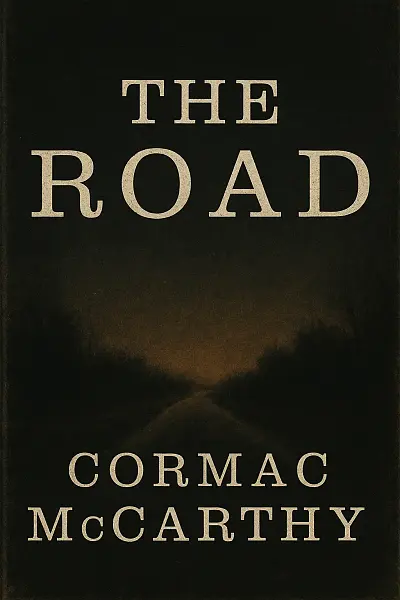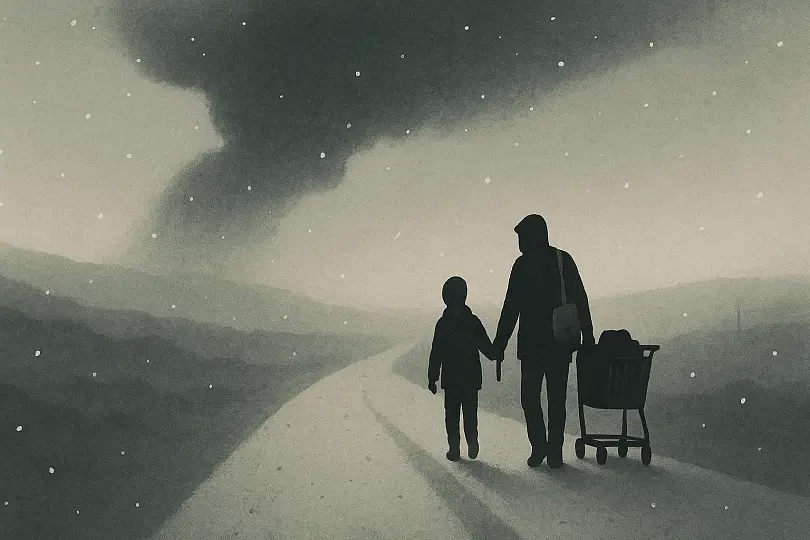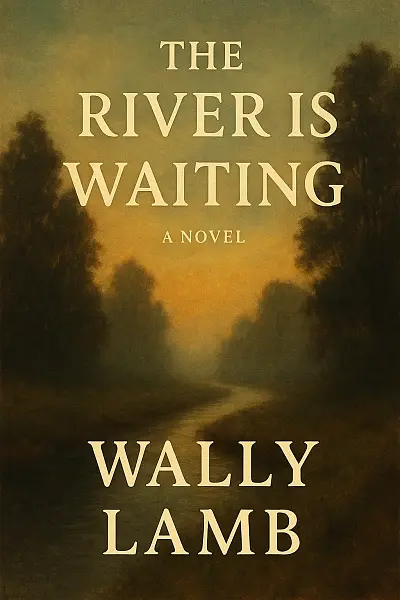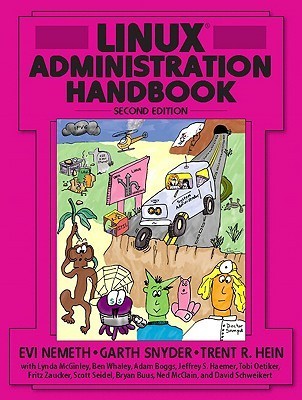
The Road
by: Cormac McCarthy
A father and his young son trudge through a bleak, ash-covered America, surviving on scraps in a world stripped bare. The land is cold, empty, and unforgiving—nothing left but their bond and a faint hope of reaching the coast.
One day, their fragile routine shatters as threats loom closer, forcing them to confront the relentless dangers of both the environment and vicious survivors. The stakes? Their very humanity, tested with every desperate choice.
What keeps you glued to the page is their raw, vulnerable love—pushing them forward through gray, haunting prose. Can love really outlast utter devastation?
"“In a world stripped bare, hope is the fire you carry, not the warmth you wait for.”"
Let's Break This Down
The Author's Voice
Atmosphere
- Bleak, oppressive, and hauntingly sparse
Every page radiates a chilling sense of desolation. Expect bone-deep cold, muted grays, and the endless ash of a dying world—it's all about emotional minimalism and stripped-down survival. - Intimate, almost claustrophobic
The world may be vast and empty, but the focus is achingly close, following a nameless father and son. This relentless intimacy heightens every moment, every risk, every quiet exchange.
Prose Style
- Bare-bones and unsentimental
Forget fancy flourishes—McCarthy’s sentences are short, sharp, and often unpunctuated. Dialogue drops in without quotation marks, blending seamlessly into the grey hush. - Poetic in its understatement
There’s a mournful beauty in the sparseness. Each word feels chosen, spare as rations in winter, yet—when you least expect it—he’ll hit you with a line of simple, devastating poetry. - Rhythmic and repetitive
The language mirrors the trudging footsteps of the protagonists—steady, rhythmic, and somehow meditative.
Pacing
- Measured, deliberate, sometimes glacial
This is not a story that hurries. The pace matches the slow, arduous journey of the father and son—pauses for small moments, interrupted by flashes of sudden tension or terror. - Occasional bursts of urgency
Just when you've settled into the monotony, the narrative will jolt you with danger, breaking the spell in a single, electrifying instant. - Silence and space matter
You’ll notice what’s not said as much as what is—the book uses silence like punctuation, leaving room for dread.
Dialogue
- Spare, fragmented, and deeply human
The conversations are often clipped, simple, and heartbreakingly earnest. It’s about what lies beneath—love, fear, hope—rather than grand speeches. - Merges seamlessly with narration
Expect dialogue that often slides straight into description, blurring the line between action and voice.
Overall Feel
- Relentlessly stark, yet oddly tender
The writing style can feel unyielding and rough, but it’s balanced by tiny sparks of warmth—a father’s hand on a son’s shoulder, a fleeting smile in the darkness. - Evocative, immersive, and unforgettably raw
Don’t expect comfort—expect to be drawn in, almost against your will, to a world and a style that strips everything unnecessary away, until only the bones of meaning remain.
Key Moments
- Ash-covered highways, where silence feels like its own character
- Father and son’s bond tested at the edge of a dying world
- Lines stripped bare—McCarthy’s haunting, minimalist prose hits hard
- Shopping cart as lifeline—desperation and hope on wheels
- “Carrying the fire” becomes a raw, unforgettable mantra
- Shocking glimpse of humanity at its worst: the cellar scene you won’t forget
- A love story between parent and child, set in the ruins of everything else
Plot Summary
The Road follows a father and his young son as they journey through a bleak, ash-covered, post-apocalyptic America. Facing starvation, cold, and constant danger from violent survivors, they push a shopping cart with their few possessions, heading south in search of warmth and safety. Along the way, they confront harrowing choices, including encounters with cannibals and other desperate travelers, their bond tested by loss and hardship. The story reaches its climax when the father, seriously ill, finally succumbs, leaving the boy alone to face an uncertain future. In the end, a kind family takes in the boy, offering a small but significant glimmer of hope amidst the devastation.
Character Analysis
The nameless father is fiercely protective and resourceful, driven almost entirely by his love for his son, whose survival becomes his sole purpose. His dedication is both his strength and his tragic flaw, as illness and exhaustion steadily erode him, revealing his vulnerability and deepening compassion. The son, in contrast, is innocent and empathetic, often questioning the morality of their actions and insisting they remain "the good guys," which marks his coming-of-age amidst crisis. Over time, the boy matures, becoming more independent and embodying the fragile hope that persists in humanity, especially after his father's death.
Major Themes
- Survival and Love: The novel explores what people are willing to endure and sacrifice for loved ones, highlighting the father-son bond as a profound source of meaning in a ruined world.
- Hope vs. Despair: Even as the landscape and humanity itself seem irredeemably lost, the persistent flicker of hope—embodied in the boy and their belief in "carrying the fire"—serves as a counterpoint to utter devastation.
- Morality Amid Collapse: The characters constantly grapple with ethical choices, such as whether to help strangers or defend themselves, questioning what "goodness" means when civilization has ended.
Literary Techniques & Style
McCarthy's writing style is spare, unadorned, and often fragmented, with strikingly minimal punctuation and unnamed characters to create a sense of universality and immediacy. Symbolism runs deep—the road itself reflects the journey through both physical wasteland and moral ambiguity, while “carrying the fire” becomes a metaphor for preserving hope and humanity. The stark imagery, repetition, and recurring motifs (like dreams and memories) amplify the bleak mood while underlining the characters’ emotional reality. Dialogue is simple yet loaded with meaning, often exposing vulnerability and connection.
Historical/Cultural Context
Set in a dystopian, post-apocalyptic America, the novel reflects anxieties about nuclear war, environmental disaster, or societal collapse that have haunted the modern era, especially post-Cold War. McCarthy never specifies the catastrophe, emphasizing universal fears about survival and the fragility of civilization. This unspecified horror allows readers to project their contemporary anxieties onto the novel’s barren landscape.
Critical Significance & Impact
The Road is widely acclaimed for its emotional depth, stylistic innovation, and philosophical resonance, winning the Pulitzer Prize for Fiction in 2007. Its spare prose and focus on universal themes have influenced a new wave of literary and cinematic post-apocalyptic works. Most importantly, the novel endures because it refuses to provide easy answers, leaving readers to wrestle with questions about love, loss, and what it means to be “good” when there’s almost nothing left.

A father's love endures—hope flickers in a world turned to ash.
What Readers Are Saying
Right for You If
Trying to figure out if The Road by Cormac McCarthy is for you? Let me break it down in the most honest, friendly way possible:
Who’s gonna love this book?
- Fans of dark, post-apocalyptic stories: If you’re into bleak settings, survival themes, and the whole “end of the world” vibe, this book is basically a must-read. McCarthy nails that haunting atmosphere.
- Readers who like deep, emotional journeys: This isn’t just another doom-and-gloom novel—the father-son bond is crazy moving. You might tear up, even if you never cry at books.
- Minimalist fiction lovers: If you dig spare, powerful writing with no wasted words, you’ll appreciate McCarthy’s style. It’s poetic, raw, and not bogged down by details.
- Philosophical types who enjoy thinking about morality, humanity, and what matters when everything’s gone—this book gives you plenty to chew on.
Who might want to skip it?
- Anyone needing lots of action: The pace is slow and there’s not a ton of plot twists. If you want nonstop excitement or big battles, this isn’t your ride.
- Those who love happy endings: Honestly, it’s pretty bleak and heavy all the way through. This is not your feel-good, hopeful story.
- Readers who need lots of dialogue: The sentences are short, and conversations are sparse. If banter and character chatter are your thing, you might get frustrated.
- If you struggle with unconventional writing: McCarthy plays by his own rules—think missing punctuation, no quotation marks. Some folks find it distracting or hard to follow.
Bottom line: If you’re looking for something powerful, emotional, and atmospheric—and you’re not afraid of the dark stuff—this is absolutely worth your time. But if you want literary comfort food or a wild thrill ride, you might want to look elsewhere.
What You're Getting Into
Picture a bleak, ash-covered world where nothing grows and hope feels scarce—The Road follows a father and son as they journey through this haunting landscape, clinging to each other in the face of relentless danger.
<br>
Their trek is a gripping fight for survival, testing the strength of their bond while forcing them to make tough decisions at every turn.
<br>
With its stripped-down prose and quiet intensity, this novel creates an atmosphere that's both devastatingly raw and deeply moving—a true testament to the power of love amid utter ruin.
Characters You'll Meet
-
The Man: Survivor at heart, he’s the father fiercely protecting his son on their harrowing journey, constantly struggling between despair and his commitment to goodness.
-
The Boy: Embodies innocence and hope, serving as his father’s moral compass and a poignant symbol of compassion in a ravaged world. His quiet strength shapes the emotional core of the story.
-
The Wife: Appears mainly in memories and flashbacks, representing loss, despair, and the temptation to give up—her absence both haunts and motivates the Man.
-
Ely: An enigmatic elderly traveler, he briefly joins the pair, sparking profound conversations about faith, humanity, and the meaning (or meaninglessness) of survival.
More Like This
If The Road gripped you with its stark portrayal of survival and love, you’ll find a hauntingly familiar pulse in Station Eleven by Emily St. John Mandel. Both novels paint post-apocalyptic landscapes that spotlight not just catastrophic loss, but the fragile embers of hope and human connection that endure in their wake. While Station Eleven weaves a tapestry of interlocking lives over decades, The Road strips its narrative bare—yet they both echo with the question of what we carry forward when the world ends.
Fans of emotionally charged journeys like The Road often find themselves drawn to The Road's spiritual sibling, The Book Thief by Markus Zusak. Although set in Nazi Germany rather than a desolate wasteland, The Book Thief shares McCarthy’s intimate narrative style and focus on the parent–child bond in harrowing times. Both stories lean heavily on the transformative power of memory, language, and small acts of kindness amid relentless hardship.
On screen, The Last of Us (HBO) mirrors much of The Road’s aching intimacy and bleak atmosphere. Their slow-burning, perilous odysseys through devastated America center not so much on monstrous threats, but on the evolving trust and poignant vulnerability between characters forced together by circumstance. You’ll sense the DNA of McCarthy’s vision in every quiet, heart-wrenching exchange and desolate, beautifully ruined landscape.
Critic's Corner
Is it possible for hope to persist in a world entirely stripped of light? Cormac McCarthy’s The Road demands this question, thrusting readers into a vision of apocalypse so stark it almost scalds. With every page, the novel asks: What is left of the human spirit when tenderness is tested by utter ruin? Few stories probe the edges of despair and love as ruthlessly—and perhaps as honestly—as this one.
What’s immediately striking is McCarthy’s minimalism. His writing is both spare and lyrical, language pared down to bare, jagged bones—as if the prose itself were carved by the same cold wind that scours the book’s landscape. Sentences stagger and halt, often shorn of punctuation or conventional flourishes, mimicking the stunted, cautious steps of the father and son. This style doesn’t just evoke atmosphere—it is the atmosphere: bleak, smothering, but occasionally pierced by flashes of stark beauty. Dialogue is stripped to its essentials, sometimes feeling more like a prayer or a code than ordinary conversation. McCarthy’s imagery, meanwhile, lingers long after the page: ash falling like doom, gray snow, the “enchanted” terror of the dark. He trusts readers to fill in the silences—and that, ironically, brings us uncomfortably close to his characters’ fear and yearning.
At its core, The Road is a meditation on parental love, moral survival, and the embers of hope when civilization’s fire has gone out. The relationship between father and son is both achingly simple and riddled with complexity. Their journey becomes a crucible for questions of goodness: Does kindness matter when the world offers nothing in return? Is passing “the fire” to the next generation enough, even when the world is dying? In the age of climate anxiety and global instability, these questions reverberate—the wasteland is not just McCarthy's, but ours, too. The novel’s refusal to deliver easy answers is perhaps its greatest strength; it never blinks, never looks away from either brutality or tenderness.
Within postapocalyptic literature, The Road distinguishes itself through intimacy and restraint. While earlier McCarthy works like Blood Meridian showcase epic violence and philosophical sprawl, The Road tightens to almost claustrophobic focus. It recalls Beckett’s existential trudges and Hemingway’s “iceberg theory,” yet its impact is uniquely McCarthy’s—there’s a mythic undertow, but the suffering and love always feel personal, never abstract. The book’s legacy within its genre—and within literary fiction as a whole—feels secure.
If there is a flaw, it may lie in the very austerity that gives the novel its force. For some readers, the relentless bleakness and sparse character details might come off as emotionally flattening or distancing. Occasional moments risk sentimentality, and the minimalism can feel oppressive, especially in longer sittings.
Yet its power is unmistakable. The Road is not just a feat of literary craft—it is a haunting and essential reminder of the fragile, stubborn light within us, even (and perhaps especially) at the end of all things.
Community Thoughts
okay but that scene where the man cradles his son by the fire and the world is just ash and silence? i can’t shake it. kept replaying in my head at 3am. good luck sleeping after that.
Woke up thinking about the man’s quiet desperation and how every step felt like dragging my own hope through ash. That one line, “If he is not the word of God, God never spoke,” just won't leave me alone.
didn’t expect a burned world to infect my dreams, but that nameless boy, man, their hope in the gray haunted me for DAYS. can’t shake the ash. why did i keep reading? because i had to know if the fire stayed lit.
I HAVEN'T STOPPED THINKING ABOUT THE FATHER—his relentless hope in a world stripped bare. He’s haunted me for days, just carrying the fire while everything else burned out. What a character.
there's this one scene with the father coughing up blood in the gray morning and i can't get it out of my head. it's raw, bleak, and that image just lingers, haunting every quiet moment since.
Leave Your Review
Local Take
Why It Matters
Cormac McCarthy's The Road really strikes a nerve with readers here—its blend of bleak survival and fierce parental love syncs up with some striking cultural parallels.
-
Historically, the theme of surviving in a collapsed world hits close, echoing memories of war, famine, and times when families clung to each other despite uncertainty. There's a bittersweet recognition in the struggle just to keep hope alive.
-
Cultural values come into play big-time: the unbreakable bond between parent and child mirrors local traditions around family loyalty and deep generational ties. The father’s relentless sacrifice feels instantly relatable, tugging at collective experiences of putting loved ones first during hardship.
-
On the flip-side, McCarthy’s grim view of humanity (where trust is as rare as sunlight) clashes a bit with longstanding optimism and communal support found in the culture. The book’s raw individualism can feel alien, sparking fascinating debates about whether hope or skepticism should win out.
-
All in all, even with its harsh outlook, The Road echoes literary traditions here—lean, symbolic language and a focus on endurance—that make its emotional impact all the more intense.
Food for Thought
Notable Achievement & Cultural Impact
- The Road snagged the Pulitzer Prize for Fiction in 2007, cementing Cormac McCarthy’s status as a literary titan.
- This bleak yet beautifully written novel has had a massive impact, inspiring everything from film adaptations to countless post-apocalyptic stories, and it’s often cited as a modern classic that redefined the genre for a whole new generation of readers.
Like what you see? Share it with other readers







